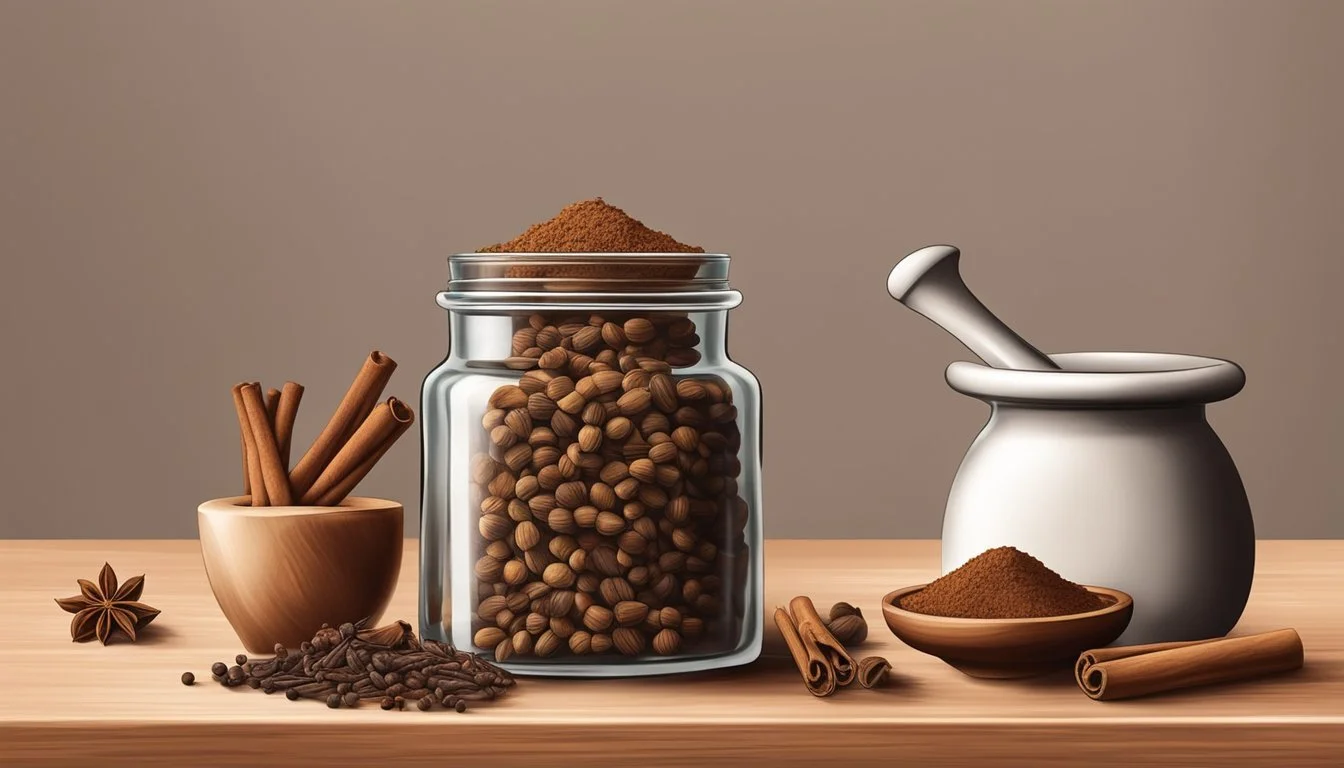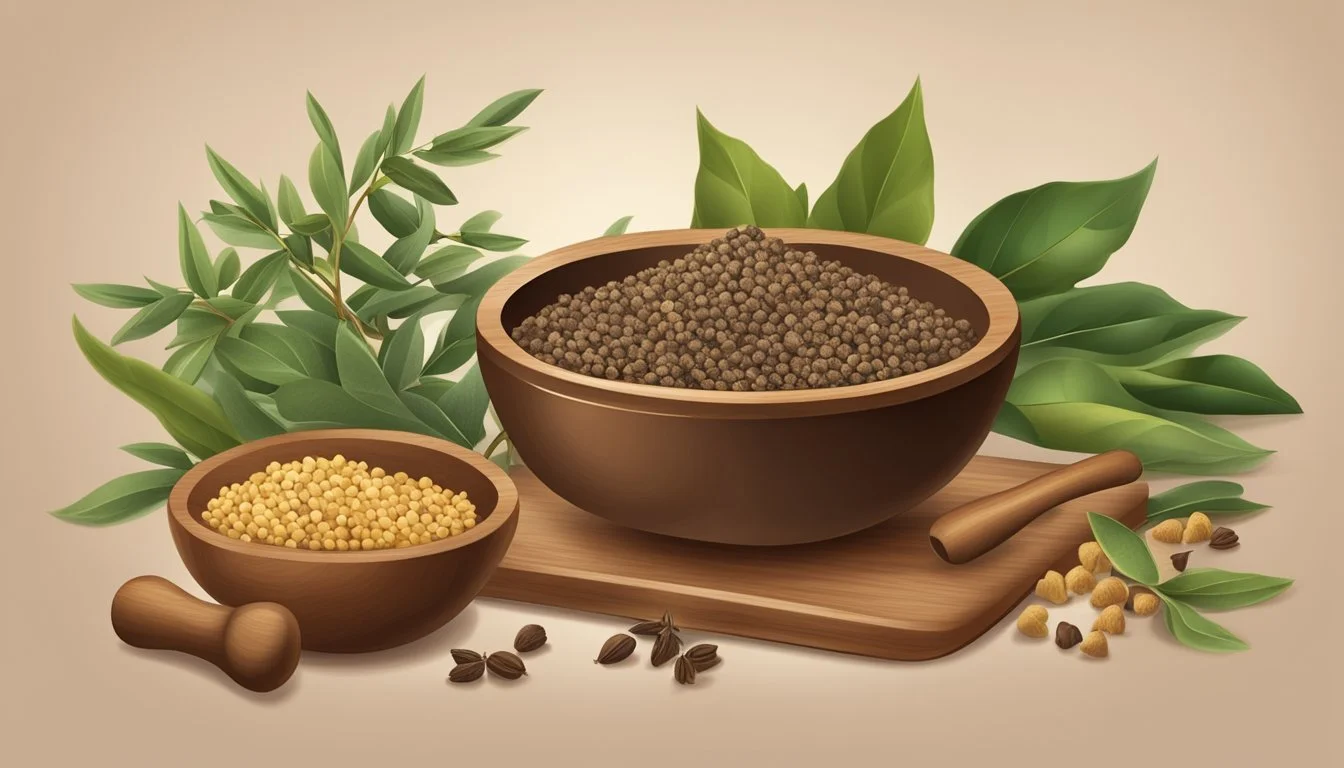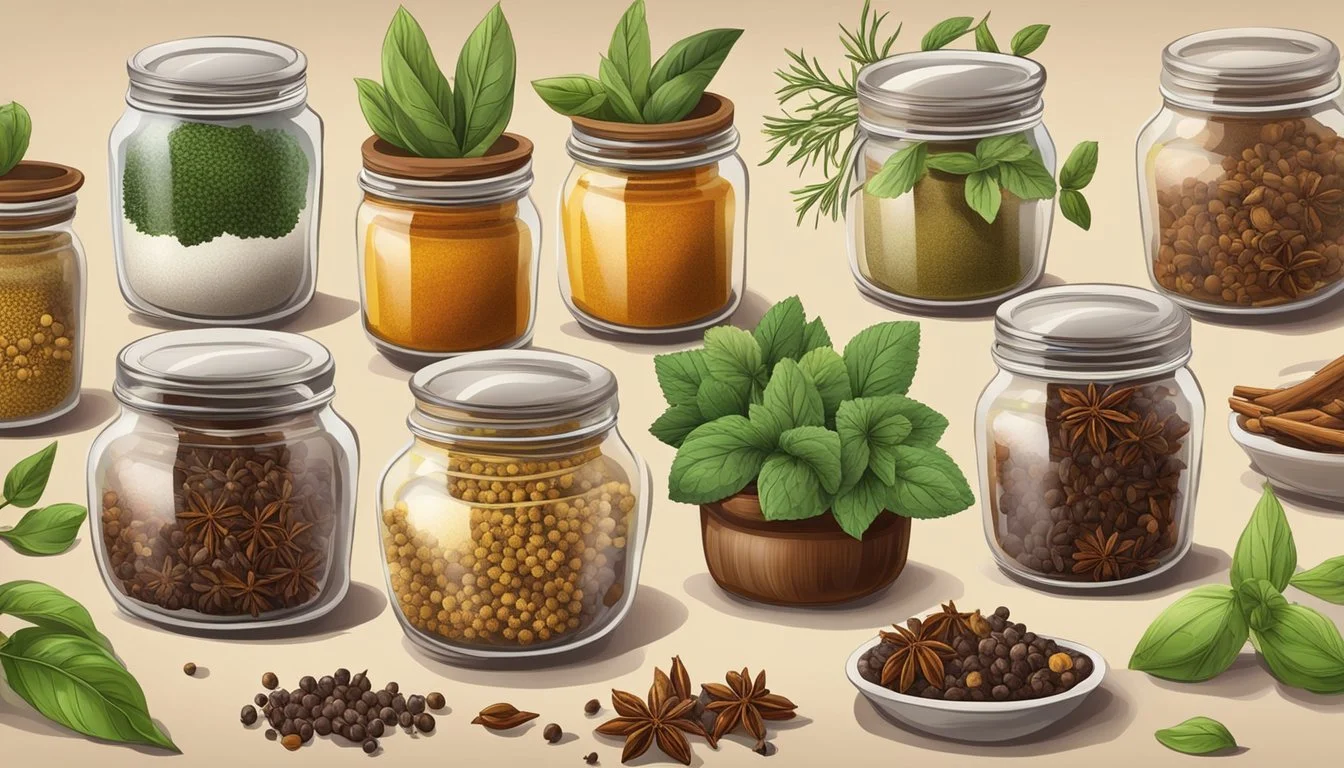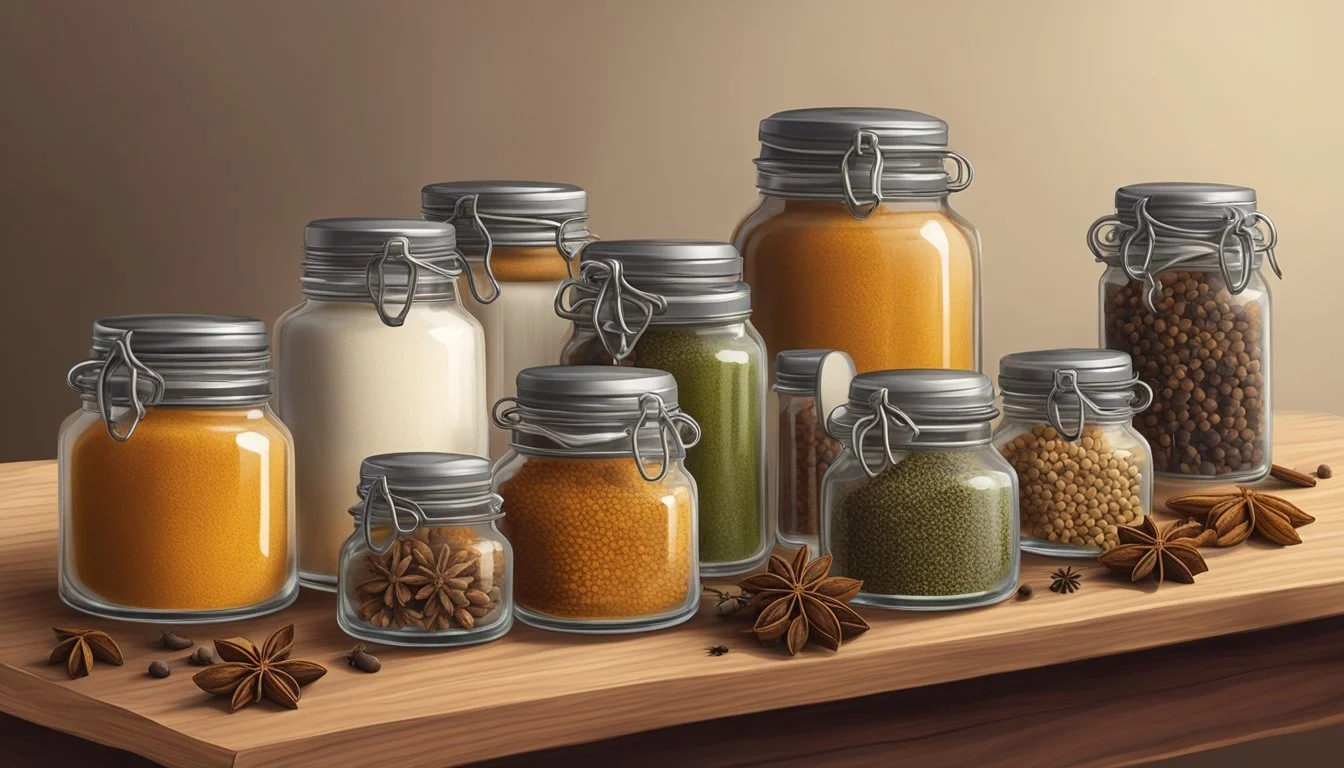Cloves Substitutes
Top Alternatives for Your Spice Rack
Cloves are a pungent, aromatic spice that is commonly used in both sweet and savory dishes around the world. Derived from the dried flower buds of the clove tree, they are recognized for their strong, warm flavor and are integral to spice blends such as garam masala, pumpkin pie spice, and Chinese five spice. However, there are scenarios when cloves might not be readily available in one's pantry or when someone might be looking for an alternative spice to balance or complement different flavor profiles.
In such cases, a variety of substitutes can be used to mimic or replace the flavor of cloves. Common alternatives include allspice, which provides a similar warm and slightly peppery note, and cinnamon, which adds a sweet woodiness to dishes. Nutmeg, another popular replacement, offers a slightly sweeter and nutty flavor profile. Ground cardamom, although distinct with its citrus-like undertones, can also be used to echo the complexity of cloves, often in conjunction with other spices. The choice of substitute often depends on the type of dish and the interplay of flavors desired by the cook.
These substitutes are not only practical solutions for when cloves are unavailable but also a way to experiment with different tastes and aromas. The subtleties in flavor and strength between cloves and its alternatives should be considered to achieve the desired outcome, whether the goal is to retain the original essence of the dish or venture into new culinary territories. In any case, understanding the nuances of these substitutes is beneficial for anyone looking to diversify their spice repertoire.
Understanding Cloves
Cloves are a potent spice with distinct characteristics, extensive culinary uses, and notable health benefits that are integral to many cultures' cuisines and traditional medicines.
Origins and Characteristics
Cloves, known botanically as Syzygium aromaticum, are the aromatic flower buds of a tree in the family Myrtaceae. Originating from the Maluku Islands in Indonesia, they have been a sought-after spice for thousands of years. The flavor profile of cloves is distinctly warm and aromatic, with a unique pungent taste that is simultaneously sweet and bitter. Whole cloves are nail-shaped and rust-brown in color, while ground cloves are used for convenience in various applications.
Culinary Uses
In the kitchen, cloves are an indispensable spice employed across a wide range of culinary styles. They are particularly popular in winter recipes due to their warming properties. Cloves can be used whole, often studded into meats or oranges for decorative and flavoring purposes, or ground into powder and added to spice mixes such as pumpkin pie spice and garam masala. The flavor of cloves is intense and thus used sparingly, but it stands out in both sweet dishes, such as apple pie, and savory dishes, like rich curries.
Nutritional and Medicinal Properties
Cloves are not only a flavorful addition to the kitchen pantry but also endowed with numerous nutritional and medicinal properties. They possess anti-inflammatory and antibacterial benefits, thanks in part to an active component called eugenol. This allows them to be used in traditional medicines for aiding digestion and combating oral bacteria. While typically consumed in small amounts, cloves are rich in manganese and other antioxidants, contributing to overall health when included in a balanced diet.
Identifying Substitute Characteristics
When seeking alternatives for cloves, it's important to consider the flavor profiles and forms available, as well as the substitutes' compatibility with the intended recipe.
Flavor Profiles
Substitutes for cloves usually fall under the category of warm spices. They typically offer a complex, aromatic taste that may range from sweet to slightly spicy. Key substitutes include:
Cinnamon: Sweet and woody, frequently used in both sweet and savory dishes.
Nutmeg: Offers a slightly sweeter and nuttier flavor, perfect for desserts and spice blends.
Ground Allspice: Carries a blend of flavors resembling a combination of cinnamon, nutmeg, and cloves themselves. Allspice is a well-rounded substitute, providing a similar warmth and complexity.
Substitute Flavor Notes Best Used in Cinnamon Sweet, woody Baked goods, stews, spice rubs Nutmeg Nutty, sweet Desserts, béchamel sauce, eggnog Ground Allspice Combination of cinnamon, nutmeg, and cloves Marinades, Jamaican cuisine, baking
Availability and Forms
Substitutes for whole cloves and ground cloves are widely available in various forms:
Ground Spices: Most common and convenient, ideally used for consistent flavoring in recipes.
Whole Spices: Offer a fresher, more intense flavor, best for infusions or dishes that cook for longer periods.
The availability of these substitutes is a significant factor, as they tend to be staple spices found in many kitchens and are easily sourced from grocery stores. It allows for versatility in the kitchen without compromising on that characteristic warm spice profile desired when using cloves.
Common Clove Substitutes
Finding the right substitute for cloves can depend on the flavor profile the recipe aims to achieve. Specific spices can mimic the warm and sweet notes of cloves, making them excellent alternatives when cloves are unavailable.
Allspice
Allspice closely resembles the taste of cloves with its warm, sweet, and slightly peppery flavor. Derived from the dried berries of the Pimenta dioica plant, ground allspice is an effective one-to-one substitute for ground cloves. It works well in both sweet and savory dishes.
Nutmeg
Nutmeg offers a sweet, nutty flavor with hints of woody spice that can act as an alternative to clove's intensity. When replacing cloves with nutmeg, it's typically recommended to start with a small amount and adjust according to taste due to its strong flavor. This spice is versatile and can be used in both ground and grated form.
Cinnamon
Cinnamon is a widely available spice that offers a sweet and woody flavor similar to cloves but without the same pungent kick. It's particularly well-suited as a substitute in sweet dishes like desserts or pastries. To use cinnamon as a stand-in for cloves, one may employ it in equal measure, though the specific ratio can be tweaked based on personal preference and the dish's requirements.
Substitutes for Specific Dishes
When cooking, the choice of spice substitute can greatly affect the flavor profile of your dish. Selecting the right substitute for cloves depends on the type of dish and its unique characteristics.
Baking
In baking, spices impart a warm, fragrant flavor to treats like apple pie and gingerbread cookies.
Pumpkin Pie: A mixture of cinnamon, nutmeg, and ginger can be used to mimic the complex taste of cloves. The common blend known as pumpkin pie spice serves as an excellent alternative.
Gingerbread Cookies: To maintain the traditional spiciness, substitute cloves with ground allspice in equal amounts, or use a pinch of ground nutmeg for a slightly different but compatible flavor.
Savory Dishes
For savory dishes like meat dishes and poultry dishes, cloves add a depth of flavor, so it’s important to use substitutes that offer similar richness.
Savory Dishes: Allspice can be used on a 1:1 basis and offers a comparable taste that complements most savory applications.
Curries: A blend of cinnamon and cardamom provides the warmth and complexity often delivered by cloves.
Soups and Stews
In the case of soups and stews, where cloves are a part of the bouquet, substitutes should be gentle and aromatic.
Pumpkin Soup: A touch of nutmeg can be a delicate replacement for cloves, enhancing the soup without overwhelming it.
Stews: Ground cardamom can contribute the sweetness and spiciness that would typically come from cloves.
Marinades and Sauces
Marinades and sauces, such as those for glazed ham, rely on cloves for a hit of spice and sweetness.
Marinades: Incorporate allspice for a similar flavor profile, ensuring the meat retains a familiar spiced scent.
Sauces: When cloves are unavailable, a combination of cinnamon and nutmeg might be used to provide a balanced sweetness and depth.
Unique Substitutes and Blends
Exploring unique substitutes and blends for cloves allows cooks to impart similar warm, piquant flavors to their dishes. These combinations can range from sweet to savory and offer varying degrees of intensity.
Ginger and Cardamom
Ginger offers a warm, spicy note reminiscent of cloves but with a unique zestiness. It can be used ground or as fresh slices when substituting for whole cloves to provide a slight bite. Cardamom, angular and aromatic, contributes a complex sweetness. These spices work well together in spice rubs and are often combined for homemade baking spice mixes.
Ground Ginger: 1/2 teaspoon for every clove required.
Cardamom: Use crushed seeds from pods or ground spice sparingly due to their intense flavor.
Star Anise and Mace
Star Anise, with its robust licorice-like aroma, stands as a substitute filled with pungency and depth. In contrast, mace, the delicate, outer thread-like aril of the nutmeg seed, imparts a softer, yet similarly warm and spicy kick as cloves.
Star Anise: Half a star anise equates to approximately one whole clove.
Grinding a piece of star anise using a spice grinder can match the consistency of ground cloves.
Mace: Best used in a 1:1 ratio with cloves but begin with less, tasting and adjusting as needed.
Fennel and Peppercorn
Both fennel seeds and white or black peppercorns carry anise-like qualities; however, fennel leans towards the sweeter end, while peppercorns deliver a sharp, earthy heat. These can serve as clove substitutes in savory dishes, spice rubs, or pickling blends.
Fennel Seed: Crush slightly to release flavors before use.
Peppercorns: Freshly ground black peppercorns are more intense than white, so they should be used more sparingly.
DIY Spice Mixes
Creating your own spice mix at home allows for customization to personal taste and is often more aromatic and flavorful than store-bought mixes. These mixes can be used in a wide range of applications, from baking to beverages.
Pumpkin Pie Spice Blend
Pumpkin Pie Spice is quintessential for fall desserts and can easily be made by combining cinnamon, nutmeg, ginger, and allspice. Here is a simple recipe for a homemade batch:
4 tsp ground cinnamon
2 tsp ground ginger
1 tsp ground allspice
1 tsp ground nutmeg
Mix all ingredients thoroughly and store in an airtight container. This blend is perfect for classic pumpkin pie, as well as other baked goods or to sprinkle on top of lattes.
Apple Pie Spice Blend
For fans of apple-flavored treats, this Apple Pie Spice Blend captures the essence of cozy apple pie. Create your own with:
4 tsp ground cinnamon
2 tsp ground nutmeg
1 tsp ground allspice
Combine these spices and store similarly. This blend is tailor-made for apple pie filling but also enhances other dishes including baked fruit crisps, oatmeal, and smoothies.
Mulling Spices
The aroma of Mulling Spices is reminiscent of holiday cheer and is a must for creating the perfect batch of mulled wine or mulled cider. To craft this warm, fragrant mixture at home, use:
4 cinnamon sticks
2 tsp whole cloves
2 tsp whole allspice berries
1 whole nutmeg, crushed
Optional: Dried orange peel
Combine in a cheesecloth bag and steep in your choice of wine or cider. The spices impart a complex and comforting flavor, ideal for mulled wine, mulled cider, or mulled apple cider.
Shopping for Substitutes
When seeking alternatives for cloves in the kitchen, one should consider the quality of the spices and understand their optimal storage and shelf life to maintain freshness and flavor.
Selecting Quality Spices
The quest for substitute spices often leads to an international grocery store, where one has access to a variety of high-quality options. When choosing a jar of ground cloves or its substitutes, one should look for spices that are vibrant in color and aroma, as these are indicative of freshness and potency. Spices should be purchased in smaller amounts if they aren't used often, to ensure they remain pungent for future uses.
Whole spices tend to last longer and retain more flavor over time.
Ground spices are convenient but lose their potency faster than their whole counterparts.
Storage and Shelf Life
Proper storage of spices is crucial in extending their shelf life and maintaining their flavor profile. Spices, whether they are whole or ground, should be kept in airtight containers in a cool, dark place away from direct sunlight or heat to prevent degradation.
Here's how one can maximize the shelf life of common clove substitutes:
Spice Shelf Life (Whole) Shelf Life (Ground) Allspice 3-4 years 2-3 years Pumpkin Pie Spice Not Applicable 1-2 years Nutmeg 4-5 years 2-3 years Cinnamon 3-4 years 2-3 years Cardamom 3-4 years 1-2 years
One should always check the aroma of spices before use, as a decrease in fragrance often signifies a loss of flavor, indicating that it is time to replace them.
FAQs on Clove Substitutes
In exploring the alternative options for cloves, this section addresses frequently asked questions and concerns regarding suitable substitutes for both ground and whole cloves in various recipes.
Addressing Common Concerns
Can one substitute the same amount of allspice for cloves in baking? Yes. When baking, a person can substitute an equal amount of allspice for ground cloves to achieve a similar flavor profile. Allspice combines the essence of cinnamon, nutmeg, and cloves and offers a comparable warm and sweet note to dishes.
What are the best substitutes for ground cloves in a recipe? For ground cloves, the optimal substitutes include:
Cinnamon: A common spice with a sweet and woody flavor that can replace ground cloves in a pinch.
Nutmeg: It has a similar pungent, sweet taste and is especially good in sweet dishes.
Allspice: This is a one-to-one substitute for ground cloves, providing a complex flavor that mirrors the combination of several spices.
What can be used as a substitute for whole cloves? A suitable substitute for whole cloves includes ground cloves, using 3/4 teaspoon for every teaspoon of whole cloves required. This adjustment maintains the flavor balance in the recipe. However, the texture and appearance might be altered slightly.
Are there any notable considerations when choosing a clove substitute for dark brown dishes? When a recipe comprises darker ingredients like dark brown sugar or molasses, spices like allspice and nutmeg blend particularly well and enhance the rich flavors without overpowering the dish.
Remember, when substituting, it should be done thoughtfully, taking into account the recipe's flavor profile and the strength of the chosen spice.









